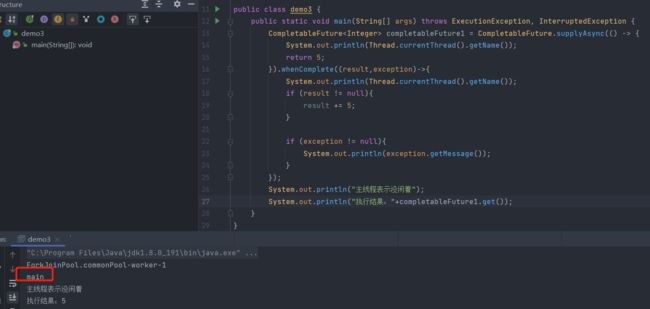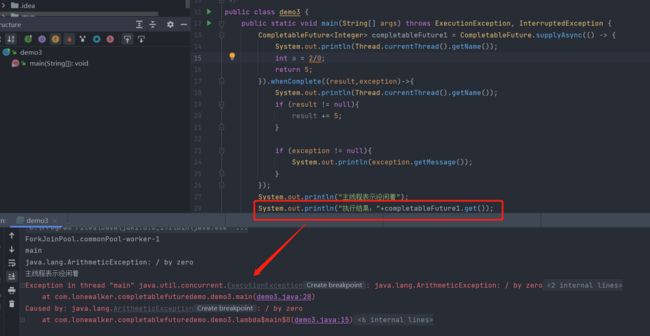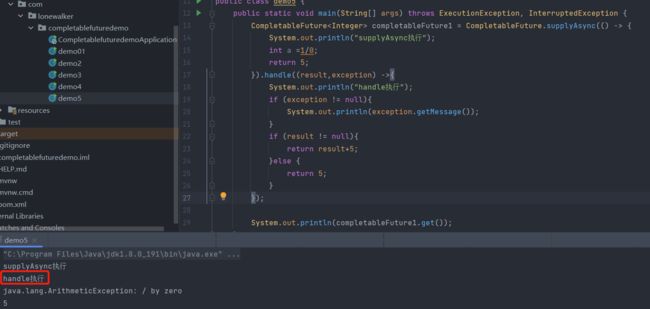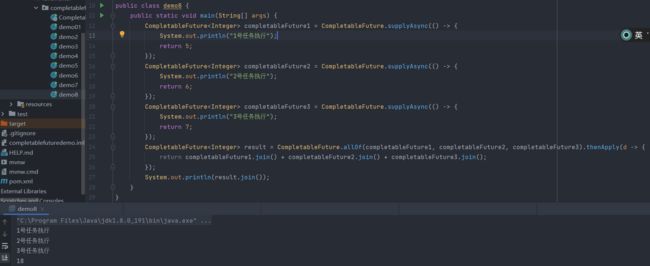异步利刃CompletableFuture
什么是CompletableFuture?
CompletableFuture 类实现了 Future 和 CompletionStage 接口并且新增了许多方法,它支持 lambda,通过回调利用非阻塞方法,提升了异步编程模型。简单来说可以帮我们实现任务编排。【文中所有代码已上传码云】
CompletableFuture的创建
先来看一个创建例子,后续再展开说说这个类中的方法:
CompletableFuture completableFuture = new CompletableFuture<>();
completableFuture.complete("Hello CompletableFuture");
System.out.println(completableFuture.get()); 需要注意的是当我们对不完整的 CompleteableFuture调用 get 方法的话,会由于 Future 未完成,因此 get 调用会一直阻塞。
创建异步任务
CompletableFuture 提供了四个静态方法来创建异步任务。
public static CompletableFuture supplyAsync(Supplier supplier);
public static CompletableFuture supplyAsync(Supplier supplier, Executor executor);
public static CompletableFuture runAsync(Runnable runnable);
public static CompletableFuture runAsync(Runnable runnable, Executor executor); 没有指定Executor的方法会使用ForkJoinPool.commonPool() 作为它的线程池执行异步代码;如果指定线程池,则使用指定的线程池运行。
static Executor screenExecutor(Executor e) {
if (!useCommonPool && e == ForkJoinPool.commonPool())
return asyncPool;
if (e == null) throw new NullPointerException();
return e;
}二者的区别很明显,supplyAsync有返回值,runAsync方法无返回值。我们通过静态方法会立刻开启异步线程执行Supplier或者Runnable提交的任务。任务执行完成,就可以打印返回值,不再需要其它线程主动调用complete来表示任务执行完成。
获取任务执行结果
public T get();
public T get(long timeout, TimeUnit unit);
public T getNow(T valueIfAbsent);
public T join();get()和get(long timeout, TimeUnit unit)是实现了Future接口的功能,两者主要区别就是get()会一直阻塞直到获取到结果,get(long timeout, TimeUnit unit)值可以指定超时时间,当到了指定的时间还未获取到任务,就会抛出TimeoutException异常。
getNow(T valueIfAbsent):就是获取任务的执行结果,但不会产生阻塞。如果任务还没执行完成,那么就会返回你传入的 valueIfAbsent 参数值,如果执行完成了,就会返回任务执行的结果。
join():跟get()的主要区别就是,get()会抛出检查时异常,join()不会。
任务完成后的处理
whenComplete
public CompletableFuture whenComplete(BiConsumer action)
public CompletableFuture whenCompleteAsync(BiConsumer action)
public CompletableFuture whenCompleteAsync(BiConsumer action, Executor executor)
public CompletableFuture exceptionally(Function fn) whenComplete是等任务完成后继续执行whenComplete的action,这里也能看出执行action的是主线程
如果有异常,当主线程在获取任务结果时就会抛出异常。
而whenCompleteAsync是通过异步线程去执行action
exceptionally
任务执行过程中出现异常的时候,会回调exceptionally方法指定的回调,但是如果没有出现异常,是不会回调的。
thenApply
当线程B依赖于线程A的执行结果时,可以使用thenApply方法来把这两个线程串行化
public CompletableFuture thenApply(Function fn)
public CompletableFuture thenApplyAsync(Function fn)
public CompletableFuture thenApplyAsync(Function fn, Executor executor)将supplyAsync方法里的结果(Integer)作为thenApply方法里Function接口的apply方法的入参
如果有异常thenApply就不会执行
handle
public CompletionStage handle(BiFunction fn);
public CompletionStage handleAsync(BiFunction fn);
public CompletionStage handleAsync(BiFunction fn,Executor executor);不同于thenApply的是handle里的方法是在supplyAsync/runAsync执行后一定会执行。
thenAccept
public CompletionStage thenAccept(Consumer action);
public CompletionStage thenAcceptAsync(Consumer action);
public CompletionStage thenAcceptAsync(Consumer action,Executor executor); 不同于上述的方法,thenAccept纯消费无返回值。
组合任务
thenCompose
这个方法也是线程B需要用到线程A的结果,不同于thenApply的是:thenCompose()用来连接两个CompletableFuture,返回值是新的CompletableFuture;thenApply()转换的是泛型中的类型,是同一个CompletableFuture。
public CompletableFuture thenCompose(Function> fn)
public CompletableFuture thenComposeAsync(Function> fn)
public CompletableFuture thenComposeAsync(Function> fn, Executor executor)thenCombine
会把两个CompletableFuture的任务都执行完成后把结果一块交给thenCombine来处理,并生成新的CompletableFuture任务。
public CompletionStage thenCombine(CompletionStage other,BiFunction fn);
public CompletionStage thenCombineAsync(CompletionStage other,BiFunction fn);
public CompletionStage thenCombineAsync(CompletionStage other,BiFunction fn,Executor executor); 谁调用的thenCombine,则BiFunction的第一个参数就是它的结果。
其他方法
allOf
allOf方法的入参是多个CompletableFuture任务,返回类型是CompletableFuture
anyOf
anyOf方法入参也是多个CompletableFuture任务,返回类型是CompletableFuture













